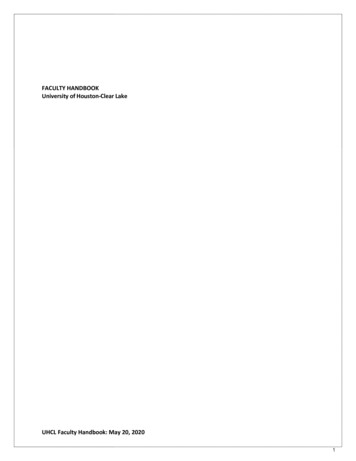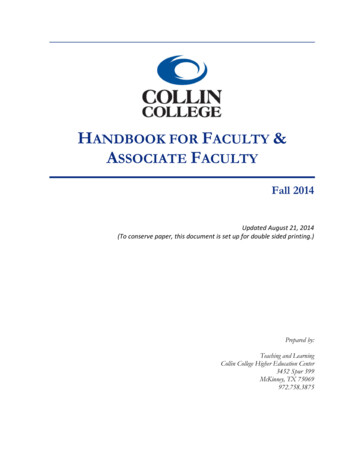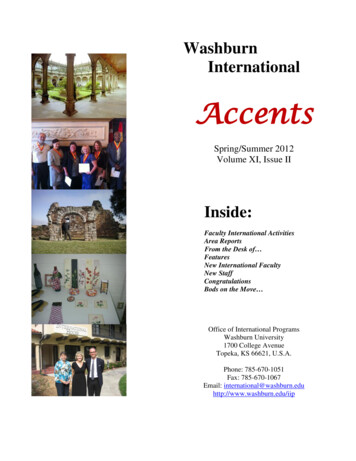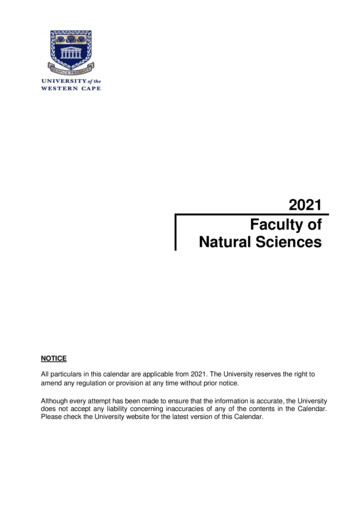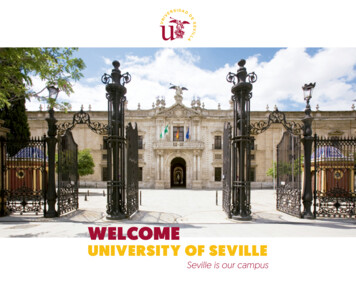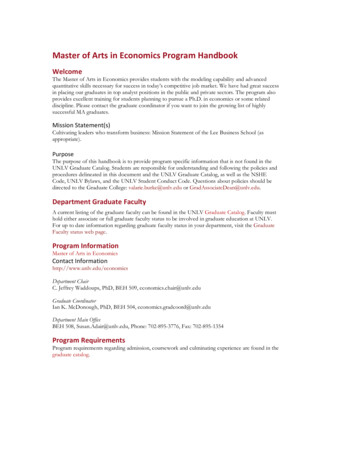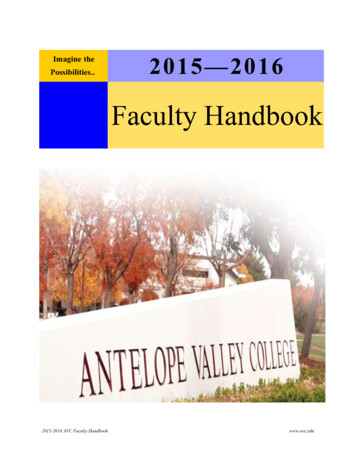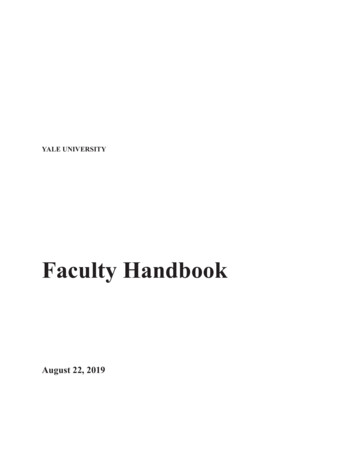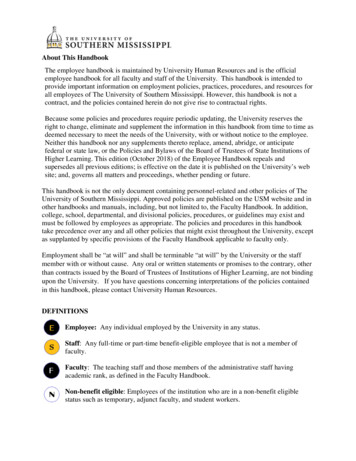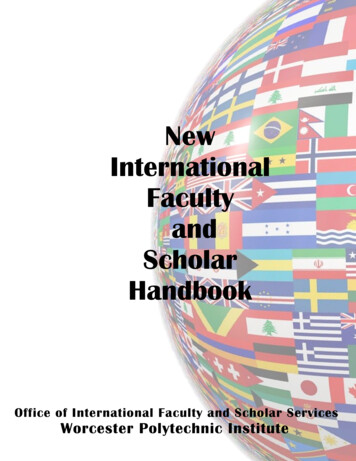
Transcription
Faculty and fice of International Faculty and Scholar ServicesWorcester Polytechnic Institute
WELCOME TO WPIOn behalf of the WPI Community, it is my great pleasure to welcome you to the WPI Campus andto the City of Worcester.You come to WPI, as many have done before you, for the intellectual stimulation of interactingwith WPI faculty, students and staff, as well as to learn about a culture different from your own.WPI is a multicultural community made up of individuals from many diverse backgrounds. As acommunity, we truly value the contributions and perspectives our international faculty andscholars bring to the campus. As we all strive to become more globally proficient, your presenceon our campus is a valuable resource for all of us.I came to the US as an immigrant myself more than 30 years ago, but I still recall very well howconfusing those first weeks and months were, things that were once familiar and yet strange.Finding your way around in a new environment can be difficult, but the experience can be funand extremely rewarding, especially if you have some helping hands to guide you.It is my hope that this Handbook for New International Faculty and Scholars will be of help to youas you prepare for your arrival at WPI as well as when you are settling into your new home hereat WPI and in Worcester.The International House and, in particular the Office of International Faculty and Scholar Servicesis here to assist you during your entire stay at WPI.I do hope you will find that the welcoming community of faculty, staff and students at WPI quicklywill make you feel completely at home. I wish you a very productive, stimulating and enjoyabletime here at WPI.Sincerely,Tom Hartvig Thomsen, DirectorOffice of International Faculty and Scholar Services1
2
TABLE OF CONTENTSIntroduction .5International House .5Office of International Faculty and Scholar Services .6Office of the Provost .6Cultural Adjustment .7Culture Shock .7Social Customs in the U.S. .8What Americans Are Like .10What You Need To Do Upon Arrival at WPI .13Familiarize Yourself with the Campus .14Your Visa Status .15Department of Homeland Security .15Immigration Staus, Visa and I-94 .15Most Common Non-immigrant Categories for International Faculty and Scholars .17J-1 Status .17H-1B Status .19Other Non-Immigrant Categories: TN, O-1, and B Status .20Lawful Permanent Resident .21Change of Address .22Social Security and U.S. Taxes .22Healthcare and Health Insurance in the U.S .24Health Insurance .24Health care .25Living in Worcester .26Housing Information .273
Utilities .29Banking .30Local Banks.31Child care and Worcester Schools .32Driving in Worcester .33Transportation .34Entertainment .35Shopping .37WPI Resources .38WPI Campus Police .38Gordon Library and IT Services .38Division of Talent and InclusionHuman Resources .39Recreational Facilities .39APPENDIX A: Restaurants and Cafes .40APPENDIX B: Conversions .45APPENDIX C: Checklist .464
INTRODUCTIONWe have prepared this handbook to assist you in your transition to WPI and our community. Inaddition to information about WPI services and programs for international faculty and scholars,this handbook is written to introduce Worcester, the second largest city in New England. The cityof Worcester is home to nine colleges and universities, many unique museums, musicalperforming groups, and local theater groups, in addition to many interesting sights.Worcester has historically attracted immigrants from all over the world including Armenians,Finns, Greeks, Irish, Italians, Jews, Lebanese, Lithuanians, Poles, and Russians. The descendantsof the “old” immigrants and the newly arrived immigrants from the Caribbean, Latin America,Africa, South and South East Asia, and the Middle East make Worcester a culturally diverse city.The handbook has a section on government regulations such as immigration information, socialsecurity, US taxes etc. It is especially important that you read the section pertaining to yourparticular visa status (J-1, H-1B, LPR etc.) The section of the handbook covering governmentregulations is up to date as of January 1, 2019INTERNATIONAL HOUSEIn an atmosphere that embraces cultural diversity andencourages social tolerance, the International House at WPIprovides programs and services to assist, educate, and supportinternational students and scholars in their transition to U.S.society and academic culture.The Office of International Student Life (ISL) serves allinternational student related immigration and culturaladjustment needs including new student orientations, workauthorizations, travel signatures, and non-resident alien tax help.Colleen Callahan-Panday, Director; Kathryn Cruz, AssistantDirector and Mirabelle Welch, Office Coordinator, staff the office.The International House is also home to the WPI English as aSecond Language (ESL) program run by Billy McGowan, Director. The ESL @ WPI Program offersEnglish language courses to help students, scholars, and their partners brush up on and learnEnglish for academic and non-academic purposes. The aim of the program is to assist students indeveloping their communicative abilities and skills to the point of proficiency through variouscourses offered throughout the year. The following two courses would be of special interest toour international faculty and scholars:5
ESL Seminar is a tutorial offering ongoing support to address the linguistic needs ofstudents and scholars in the major skills areas, along with practice giving oral presentationsand studying aspects of U.S. culture and history. The course also includes field trips tomuseums, concerts, and other cultural activities. ESL for Spouses teaches the legal partners of students and scholars the English languageneeded to establish themselves and meet their needs in U.S. culture. The course focuseson listening, speaking, and vocabulary development. The course also includes field trips tomuseums, concerts, and other cultural activities.For more information, please contact Billy McGowan. E-mail BillyM@wpi.eduOFFICE OF INTERNATIONAL FACULTY AND SCHOLAR SERVICESThe Office of International Faculty and Scholar Services is also located at the International House.In collaboration with the Provost’s Office, the Office for International Faculty and ScholarServices oversees programs and services for international scholars, post-doctoral fellows,research scientist/engineers, and international faculty. The office will issue all immigrationrelated documentation; represent WPI as the petitioner on petitions filed with USCIS andrepresent WPI when filing Labor Condition Applications (LCA) and Program Electronic ReviewManagement filing of Labor Certifications (PERM) with the Department of LaborOFFICE OF THE PROVOSTAppointments as faculty, post-doctoral fellow, research scientist, visiting scholars all come fromthe Provost Office. The Provost, Wole Soboyejo, Senior Vice President and Provost ad interim.makes all full-time faculty appointments. The process starts in the academic department and therequest to hire is forwarded to the Provost by the respective academic dean. The respectiveacademic deans appoint adjunct faculty. The Vice Provost for Research, Professor Bogdan M.Vernescu, makes all non-faculty research appointments.6
CULTURAL ADJUSTMENTWhen moving to a new country, you will most likely experience some adjustment issues. Livingand working in a different culture is different from visiting a foreign country as a tourist. Belowyou will find information about culture shock, American social customs, and information aboutwhat Americans are generally like in the United States. (U.S.)CULTURE SHOCK"Culture Shock," or “cultural adjustment,” is the term used for the sense of disorientation andconfusion, which almost all people experience to some degree when they arrive in anothercountry and a new culture. When you leave what you are familiar with (food, language,family/friends, climate, etc.) and are expected to function in your new culture, you mightexperience culture shock.Symptoms of Culture Shock: Cultural adjustment can have both emotional and physicalsymptoms, including sadness, loneliness, insomnia, depression, irritability, lack of confidence,feelings of insecurity, longing for family, feelings of loss of identity, or even physical aches andpains.Dealing with Culture Shock: It is important to acknowledge that cultural adjustment is a realissue and it can take time to overcome. It is okay to feel sad or to miss home, and you shouldallow yourself time to feel this way. However, it is also important to seek ways to connect to yournew culture and your new social environment. This will help you adjust and make you feel morecomfortable in your new environment. Getting to know your, colleagues, department staff,neighbors, participating in social activities, exploring Worcester and its surroundings will helpwith this transition. Regular exercise, a proper diet, and adequate amounts of rest and sleep willalso help with this process.There are some simple steps you can take to minimize the impact of culture shock: Listen and observe. Watch the reaction of others in different situations. The more you knowabout how Americans behave, the less uncomfortable you will feel.Ask questions. Don't assume that you will always know what is going on or that you willalways understand every communication.Try not to evaluate or judge. Many things will be different. It is important not to vieweverything as good or bad in comparison to your own culture.7
STAGES OF CULTURE SHOCKPhase 1: Honeymoon: When you first arrives in a new culture, every experience tends to be“new,” “exciting,” and “interesting”.Phase 2: Culture Shock and Anxiety: “What am I doing here”? Newly arrived visitors tend totransition to this phase after 2-3 weeks in the US. This generally happens after you have settledinto the routine of work and things stop being “new” and “exciting”. During this period,frustration can take hold, and issues like language, food, and figuring out smaller cultural issuesbecome draining and aggravating.Phase 3: Acceptance and Integration: At this point, you start to overcome some frustrations andstart to feel more comfortable in your new culture. This initial adjustment generally takes from acouple of weeks to a couple of months.SOCIAL CUSTOMS IN THE U.S.It is difficult to generalize about social customs in the US because the American society is verycomplex and diverse. I hope that the following information will be helpful as you adjust to yournew "culture".8
GREETINGSUpon meeting each other for the first time, men (always) and women (usually) shake hands,firmly. "How are you doing?" "good morning," "good afternoon," and "good evening" are formalgreetings. Usually people just say "hello" and "hi”. (Remember that social customs differ indifferent sections of the country and between younger and older people.) “How are you?” is acommon greeting. It is not generally meant as a question; instead it is an alternative to “hello.”A common response to “how are you?” is “I’m good, how are you?” instead of a detailedexplanation of how you are actually feeling.First names are more readily used in the US than in other countries. It is acceptable automaticallyto use the first name of someone of approximately your same age or younger.Men and women in the northeast of the US might be surprised if you use Mr., Mrs., Miss, or Ms.with a first, or "given" name, as is the custom in some countries. These titles are generally usedwith the last name, or “family name” (Although in the southern regions of the US, using thesetitles with first names might be more common). If you have any doubts about what to callsomeone, simply ask, "What should I call you?" If people seem unsure how to address you, tellthem the name you prefer, and pronounce it slowly, so they will understand.The use of "nicknames" is fairly common in the United States. A nickname is not the person's realname, but a name given by family or friends. Sometimes a nickname is a shortened version of theperson’s first or his family name – like “Bob” for Robert, or “Andy” for John Anderson. Beingcalled by a nickname is not uncomplimentary; in fact, it often is a sign of acceptance andaffection.SOCIAL INVITATIONSSocial invitations are extended by telephone or bywritten note or a printed invitation, and in this age ofsocial media, sometimes by text, email, or an onlinecard. Some casual, verbal comments that sound likeinvitations -- like "come by and see me" or "let’s dolunch" -- are generally not intended to be takenliterally. An invitation is not firm until a date and timeand other arrangements are set.PROMPTNESSIt is polite to arrive at or shortly after (but not before) the appointed hour. If you will be morethan 10 minutes late, contact the host and say when you will arrive.9
RSVPSIf a response to an invitation is requested you should reply with a yes or no. This will often be inthe form of “Please RSVP to e-mail or phone number”. The initials RSVP actually comes from theFrench language and stands for “repondez, s’il vous plait” which literally means “respond if youplease. To RSVP that you will be attending and then not show up, or vice versa, is considered rudein the US.TIPPING AND GRATUITYService charges, or tips, are not added to the bill in restaurants, but are expected (and oftenneeded) by the waiter/waitress as the main source of income. Tips in restaurants are 15% to 20%depending on the quality of service. You don't tip in a cafeteria or places where you help yourself.Sometimes if you are eating in a large group, the gratuity might be automatically included in thebill, but this would be noted at the bottom. If you do not see any mention about “gratuity added”on your bill, you can assume that you will have to leave a tip.WHAT AMERICANS ARE LIKEThe notion of the US as a "melting pot" where all cultures blend is somewhat misleading.Although some immigrants to the US have given up their original languages and customs, thereare still many differences among Americans. The United States is populated by a large and highlydiverse collection of individuals, and it is difficult to generalize about "what Americans are like."As you read the typical traits listed below, remember that US society is composed of people frommany social, cultural, ethnic, religious and national backgrounds, different economic situations,and vastly different philosophies of life.AMERICANS ARE INDIVIDUALSProbably above everything else, Americans consider themselves individuals. There are strongfamily ties and strong loyalties to groups, but individuality and individual rights are mostimportant. If this seems like a selfish attitude, it also leads Americans to an honest respect forother individuals and an insistence on human equality.AMERICANS ARE DIRECTHonesty and frankness are more important to Americans than "saving face”, which meansAmericans will be direct when it comes to sharing their thoughts. They may seem blunt at times,and they may bring up topics and issues that you may find embarrassing, too controversial, oreven offensive. Americans are quick to get to the point and do not spend much time on formal10
social amenities. This directness encourages Americans to talk over disagreements and to try topatch up misunderstandings themselves, rather than ask a third party to mediate disputes.AMERICANS ARE VERY INFORMALIn general, Americans are very informal when it comes to interactions with others. A person fromanother country may consider this cross-generation, cross-class informality disrespectful, evenrude, but it is a part of US culture.AMERICANS ARE GENERALLY COMPETITIVEMost Americans have a competitive nature. They place a high value on achievement, which leadsthem to be focused on their own success. This leads them to compete against each other.AMERICANS ARE FRIENDLY, BUT IN THEIR OWN WAYIn general, friendships among Americans tend to be shorter and more casual than friendshipsamong people from other cultures. This has something to do with American mobility and the factthat Americans do not like to be dependent on other people. Americans also tend to"compartmentalize" friendships, having "work friends”, "family friends", “school friends”, and soon. You may also notice Americans will smile a lot, which is typically genuine and used to showfriendliness.AMERICANS ASK A LOT OF QUESTIONSAmericans can ask some questions that may to you seem pointless, uninformed, or elementary.Someone you have just met may ask you very personal questions. No impertinence is intended;the questions usually grow out of a genuine interest.AMERICANS ARE TIME-CONSCIOUS AND VALUE PUNCTUALITYAmericans keep appointment calendars and live according to schedules. They usually are on timefor appointments, or no more than a few minutes late. It is considered rude to show up late toan appointment without notification that you will be arriving more than a few minutes past theagreed upon time. Common courtesy is to let the other party know if you will not be able to makean appointment or meeting as soon as you know, to allow for rescheduling if necessary.AMERICAN POLITENESSAmericans often use the words “please,” “thank you,” and “I’m sorry” more often than aninternational person might be used to. In particular, Americans tend to say, “I’m sorry” insituations where you might not think an apology is necessary, such as brushing against someone11
on a train or bumping into someone in the hallway—it doesn’t have to be a big problem to say“I’m sorry”. A common response to “I’m sorry” is “no worries” or “it is okay.”Saying “please” when requesting something and “thank you” when receiving something is alsovery customary in the US, and may be considered rude if you do not also use these phrases, evenamongst close friends or family members.12
WHAT YOU NEED TO DO UPON ARRIVAL AT WPIWhen arriving at WPI you should check in with the following offices. First, you should report toyour respective department to make sure you get set up with your office and/or laboratory.Within a couple of days of your arrival, you must report to the Office of International Faculty andScholar Services located at the International House, 28 Trowbridge Road. For this initial meeting,you should bring your passport, your immigration documents and any Health Insurancedocumentation you have if you are not getting health insurance from WPI.You must meet with Mr. Thomsen, Director Office of international Faculty and ScholarsServices to review the checklist and the Handbook. Bring your passport and immigrationdocuments to this meeting. You should call the office to schedule an appointment. Phonenumber (508) 831-6030ID Office, East Hall on Boynton StreetOffice of International Facultyand Scholar Services28 Trowbridge RoadWorcester MA 01609Phone: (508)831 6030# 9 on the WPI Campus MapIT Services in Gordon Library toregister your laptop, smart phoneand/ or I-padSchedule time for the HumanResource Orientation if anemployee receiving payment fromWPI. You must also complete theForeign National Information Form13
FAMILIARIZE YOURSELF WITH THE CAMPUSWe suggest you take the time to familiarize yourself with the WPI campus. Using the CampusMap you should locate Campus Police, Boynton Hall, Campus Center, Higgins House, GordonLibrary and your department. Also, take a walk to Highland Street and to Gateway About-WPI/WPI CampusMap.pdf14
YOUR VISA STATUSDEPARTMENT OF HOMELAND SECURITYThe primary objective of the Department of Homeland Security is to protect the US againstterrorist attacks, but it is also an objective of the department to enhance public service. Thereare three major organizations under DHS charged with enforcing immigration regulations in theUS:Immigration and Customs Enforcement (ICE): The primary functions of ICE are immigration andcustoms investigations, customs air and marineinterdiction, immigration and customs intelligence,detention, and removal.Customs and Border Protection (CBP): As a single unified border agency, CBP is charged withborder patrolling, customs service, and immigration inspection at the ports of entry (landborders, airports, and harbors). When you enter the US, your first contact will be with an agentfrom this agency.U.S. Citizenship and Immigration Services (USCIS): Most adjudication of immigrant and nonimmigrant benefits in the U.S. is done by USCIS either at a local USCIS Office or by mailingapplications to a USCIS Service Center. Petitions to adjuststatus, extend your stay are examples of cases filed withUSCIS.For more information, visit: http://www.dhs.gov/IMMIGRATION STAUS, VISA AND I-94Immigration status refers to the way in which a person is present in the U.S. Basically theImmigration and Nationality Act (INA) divides all non-U.S. citizens in to two large groups.Resident Aliens, also known as Permanent Resident Alien or Green Card Holders and nonimmigrants. The non-immigrant status is for people who enter the U.S. on a temporary basis ona visa for a specific purpose. As a non-immigrant, one needs to be careful to maintain the15
status. Non-immigrants are admitted in a specific visa status noted by a letter, such as H-1, J-1,O-1 and B-1 etc.The US visa is the label placed by a United States consular office on a page of your passport. Itindicates that the consular office has determined that you are qualified to apply for admission tothe United States in a particular immigration classification. A valid visa does not ensure an alien'sentry into the US. An immigration officer at the port of entry makes this decision.A visa contains the following information: The visa numberThe location of the issuing consular postThe visa classification (H-1B, J-1, etc.)The date of issuanceThe expiration dateThe number of applications for admission to the US for which it is valido The letter “M” will appear if you have indefinite (multiple) entries to the US duringthe period of the visa’s validityThe expiration date on the visa does not have any relationship to the length of time you can stayin the US, but only to the length of time it is valid to present to immigration when entering thecountry. The duration of your legal stay in the US will be noted on your immigration entry stampand on your form I-94.At the point of entry to the U.S., a non-immigrant is issued an electronic arrival/departure recordalso known as form I-94. Please note that the electronic I-94 will have an expiration date at thetop right corner of the page when printed. This expiration date doesnot refer to the validity of your presence in the US. The only date thatyou should be concerned with is the date you are admitted until,which will be a specific date or in the case of J visa holders will readD/S.To access your electronic I-94, visit CBP's website at https://i94.cbp.dhs.gov/I94/#/homeIf you change your non-immigrant status in the U.S. by filing an application for change of statuswith USCIS, you will receive a paper I-94 with the approval notice. Please note that you shouldalways have a valid I-94 to document your legal status in the U.S.16
MOST COMMON NON-IMMIGRANT CATEGORIES FOR INTERNATIONAL FACULTY ANDSCHOLARSFaculty: For tenure track faculty, we typically start by filing for the H-1B visa designed for peopleworking in Specialty Occupations. After a couple of years working for WPI, we will consider filingfor a “green card” as an outstanding professor or researcher in the EB-1 Category. In certainspecial situations, we might also consider filing for a Labor Certification under the PERMregulations. For non-tenure track faculty and visiting faculty, we will file either for the H-1B or forthe J-1 as an Exchange Visitor.Scholars: For post-doctoral fellows, we will file for either the H-1B or the J-1 Exchange Visitor. Insome situations, we will also have post-docs start on the F-1 Optional Practical Training or on theJ-1 Academic Training. For visiting scholars with primary funding from sources other than WPI,we will issue documents for J-1 visa as an Exchange Visitor. For short-term (2-4 weeks) visits forthe purpose of conference/workshop participation, faculty collaboration etc. which does notinclude any payment from WPI, we will sometimes suggest the Visitor Category.J-1 STATUSExchange Visitors are admit
the Provost Office. The Provost, Wole Soboyejo, Senior Vice President and Provost ad interim. makes all full-time faculty appointments. The process starts in the academic department and the request to hire is forwarded to the Provost by the respective academic dean. The respective academic deans appoint adjunct faculty.
